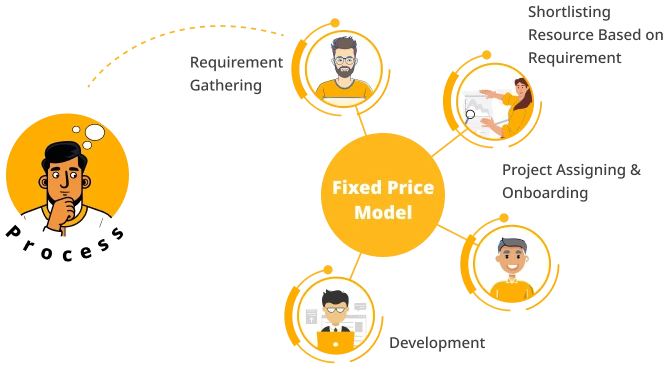An Introduction to NFT Marketplace
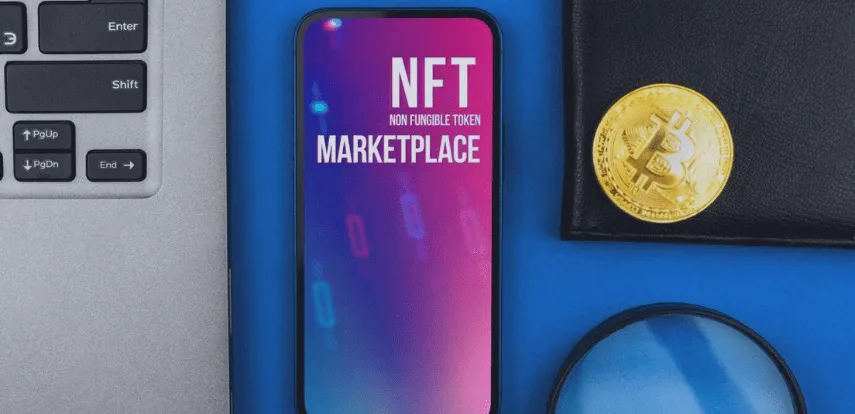
NFT marketplace is a digital space where individuals and businesses can buy, sell, or auction off non-exchangeable virtual items called non-fungible tokens (NFTs). Unlike traditional online marketplaces that trade in fungible commodities like money, stocks, or cryptocurrency, each NFT is unique and often invaluable. Common NFTs include digital art, collectibles, gaming items, and virtual land.
Because NFTs can’t be replicated or exchanged for other goods, they differ significantly from their fungible counterparts. That means that the price of an individual NFT can fluctuate wildly, depending on supply and demand. Some recognizable NFTs have sold for millions of dollars, while others have only garnered a few cents.
Explore more by going through this detailed guide on NFT.
Steps of Creating an NFT Marketplace
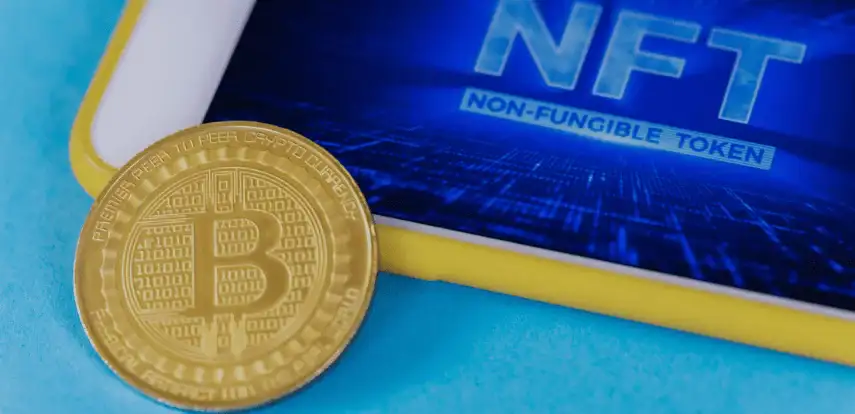
Creating an NFT (Non-Fungible Token) marketplace involves several key steps. Here is an overview of the process:
- Define Your Concept: Determine the purpose, target audience, and unique selling points of your NFT marketplace. Consider factors such as the types of assets you plan to support (art, music, collectibles, etc.), any specific features or functionalities you want to offer, and how you will differentiate yourself from existing marketplaces.
- Select Blockchain Platform: Choose a suitable blockchain platform that supports NFTs, such as Ethereum, Binance Smart Chain, or Flow. Consider factors like scalability, transaction fees, community support, and developer resources when making your selection.
- Smart Contract Development: Create smart contracts that define the rules and logic of your NFT marketplace. This includes contract standards like ERC-721 or ERC-1155, token creation, ownership transfer, royalties, and any additional features specific to your marketplace.
- User Authentication and Wallet Integration: Implement a user authentication system to allow users to create accounts, manage their NFTs, and interact with the marketplace. Integrate wallet solutions like MetaMask or WalletConnect to enable secure storage and NFT transactions.
- Design and User Interface: Develop an intuitive and visually appealing user interface (UI) for your marketplace. Consider factors like browsing and filtering options, NFT display, artist profiles, auction functionality, and user-friendly navigation.
- NFT Listing and Minting: Enable users to list and mint their NFTs on your marketplace. Implement a user-friendly interface for artists and creators to upload their digital assets, set pricing, add descriptions, and specify any additional metadata.
- Marketplace Functionality: Implement core marketplace features such as browsing and searching for NFTs, sorting by categories, filtering options, bidding or auction mechanisms, fixed-price listings, and a smooth checkout process.
- Payment Integration: Integrate a secure and reliable payment gateway to facilitate transactions on your NFT marketplace. Consider supporting cryptocurrencies or stablecoins commonly used in the blockchain platform you selected.
- Security and Trust: Implement robust security measures to protect users’ assets and personal information. Consider using encryption, secure socket layers (SSL), and implementing best practices for data protection and privacy.
- Launch and Marketing: Plan a marketing strategy to promote your NFT marketplace. Utilize social media, influencer partnerships, content marketing, and other channels to attract artists, collectors, and enthusiasts to your platform.
- Ongoing Maintenance and Updates: Continuously monitor and improve your NFT marketplace based on user feedback and market trends. Regularly update smart contracts, enhance features, and address any security or performance issues.
It’s important to note that creating an NFT marketplace requires technical expertise and a thorough understanding of blockchain technology. Engaging experienced NFT developers and blockchain consultants can help ensure a successful implementation of your marketplace.
Essential Features of NFT Marketplace
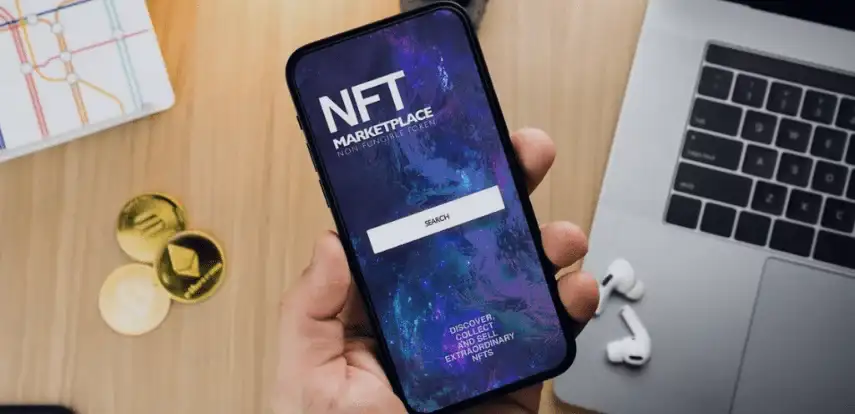
An NFT marketplace requires several essential features to facilitate the buying, selling, and trading of digital assets. Here are some key features to consider:
- User Authentication: Implement a user authentication system to allow users to create accounts, log in securely, and manage their NFTs and transactions.
- NFT Listing and Minting: Enable users to easily list and mint their NFTs on the marketplace. Provide a user-friendly interface for artists and creators to upload their digital assets, set pricing, add descriptions, and specify any additional metadata.
- Browse and Search Functionality: Implement intuitive browsing and search features to allow users to explore and discover NFTs based on categories, tags, artists, or specific criteria. This enhances the overall user experience and helps users find desired assets easily.
- Auctions and Bidding: Offer auction functionality to allow users to bid on NFTs and participate in competitive bidding. Enable features like bid increments, automatic bid updates, and countdown timers to create a sense of urgency and excitement.
- Fixed Price Listings: Provide the option for fixed price listings, allowing users to set a specific price for their NFTs. This allows for immediate purchase without the need for bidding.
- Wallet Integration: Integrate popular cryptocurrency wallets like MetaMask or WalletConnect to provide secure storage of users’ NFTs and enable seamless transactions on the blockchain.
- Payment Gateway: Integrate a secure payment gateway that supports cryptocurrencies or stablecoins, enabling users to purchase NFTs using their preferred digital currencies.
- Royalties and Licensing: Incorporate royalty and licensing mechanisms to ensure creators receive a portion of the proceeds whenever their NFTs are resold on the marketplace.
- User Profiles and Social Features: Allow users to create profiles, showcase their NFT collections, follow artists, and interact with other users through likes, comments, and sharing.
- Ratings and Reviews: Implement a system for users to rate and review NFTs, providing transparency and feedback for the community.
- Security and Trust: Implement robust security measures, including encryption, secure communication protocols, and user verification processes, to protect users’ assets and personal information.
- Analytics and Insights: Provide analytics and insights to users and creators, offering data on sales, trends, and performance metrics to help inform their strategies and decisions.
These essential features form the foundation of an NFT marketplace and contribute to an engaging and secure user experience for buyers, sellers, and collectors in the NFT ecosystem.
Ways to Start a Successful NFT
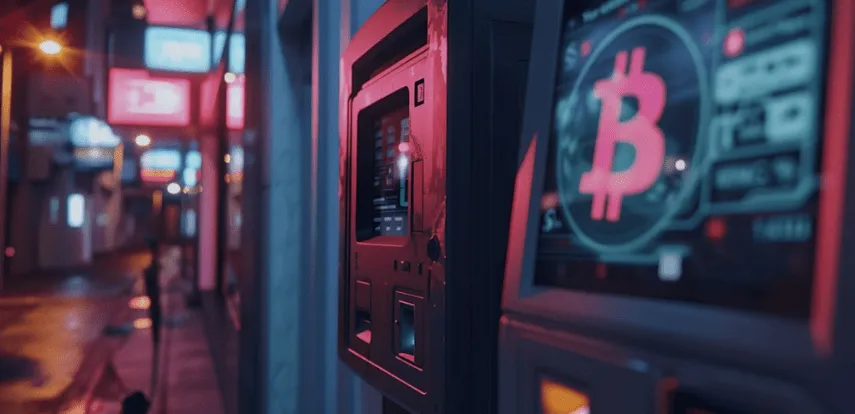
Starting a successful NFT involves several key steps. Here’s a guide to help you get started:
- Determine Your NFT Concept: Identify the type of digital asset you want to tokenize as an NFT. It could be artwork, music, collectibles, virtual real estate, or any unique digital item that holds value or meaning.
- Create or Acquire Your Digital Asset: Develop or obtain the digital asset that will be associated with your NFT. Ensure it is of high quality and meets the standards expected by your target audience.
- Choose the Right Blockchain Platform: Select a blockchain platform that supports NFTs. Ethereum is the most popular choice, but other platforms like Binance Smart Chain, Flow, or Tezos also offer NFT capabilities. Consider factors like network fees, scalability, and community support.
- Set Up a Wallet: Set up a digital wallet that is compatible with the chosen blockchain platform. This will enable you to store, send, and receive your NFTs. Wallets like MetaMask or Trust Wallet are commonly used for Ethereum-based NFTs.
- Mint Your NFT: Minting refers to the process of creating and linking your digital asset to an NFT on the blockchain. Use an NFT marketplace or platform that supports minting. Follow the instructions provided by the platform to complete the minting process.
- Define Rarity and Attributes: Determine the rarity and attributes of your NFT. This could include limited editions, special features, unlockable content, or any unique characteristics that add value to your NFT.
- Set a Price and Listing: Determine the price for your NFT and list it on an NFT marketplace. Consider factors like market demand, perceived value, and the uniqueness of your NFT when setting the price. Provide a clear and compelling description to attract potential buyers.
- Market and Promote Your NFT: Actively promote your NFT through social media, online communities, forums, and relevant platforms. Engage with potential buyers, collectors, and influencers to create buzz and increase visibility for your NFT.
- Engage with the Community: Interact with the NFT community by participating in discussions, attending virtual events, and collaborating with other creators. Building connections and fostering relationships within the community can help create awareness and support for your NFT.
- Provide Authenticity and Value: Ensure transparency and authenticity by providing detailed information about your NFT, its provenance, and any associated rights or ownership. Deliver value to buyers through unique experiences, utility, or additional perks linked to your NFT.
Remember, success in the NFT space requires continuous learning, adaptability, and staying updated with the evolving trends and preferences of the community.
Different Types of Digital Assets Tokenized as NFTs
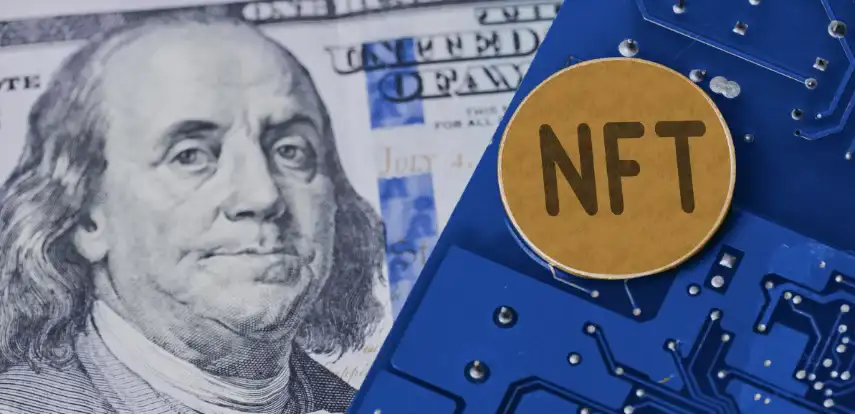
NFTs have the potential to tokenize a wide range of digital assets. Here are some common types of digital assets that can be tokenized as NFTs:
- Artwork: Digital art, illustrations, animations, and graphic designs can be tokenized as NFTs, allowing artists to authenticate and sell their creations in the digital space.
- Music: Songs, albums, music compositions, and sound effects can be tokenized as NFTs, enabling musicians and composers to sell their work directly to fans and collectors.
- Collectibles: Virtual collectibles, such as trading cards, virtual pets, virtual real estate, and in-game items, can be tokenized as NFTs, offering ownership and scarcity to collectors.
- Virtual Worlds: Virtual worlds, like immersive 3D environments or augmented reality experiences, can have their assets tokenized as NFTs, including virtual land, buildings, avatars, and other digital objects.
- Domain Names: Internet domain names can be tokenized as NFTs, allowing individuals or organizations to buy, sell, and transfer ownership of unique and desirable domain names.
- Digital Fashion: Virtual clothing, accessories, and wearables for online avatars or virtual reality environments can be tokenized as NFTs, enabling users to express their digital style.
- Sports Memorabilia: Digital sports memorabilia, such as trading cards, athlete collectibles, game highlights, or limited edition moments, can be tokenized as NFTs, providing authenticity and ownership verification.
- Virtual Tickets and Events: NFTs can represent virtual event tickets, conference passes, or access to exclusive online experiences, providing a secure and verifiable way to manage digital event attendance.
- Intellectual Property: NFTs can represent intellectual property rights, including patents, copyrights, trademarks, or licenses, offering a unique way to manage and protect ownership of creative or innovative works.
- Digital Identity and Personal Data: NFTs can be used to tokenize digital identity and personal data, allowing individuals to maintain control over their digital profiles, reputation, and personal information.
These are just a few examples of the diverse range of digital assets that can be tokenized as NFTs. The versatility of NFTs opens up exciting opportunities for creators, artists, collectors, and individuals to engage in the digital economy and establish verifiable ownership of their digital assets.
Considerations and Challenges While Developing and Launching NFT Projects
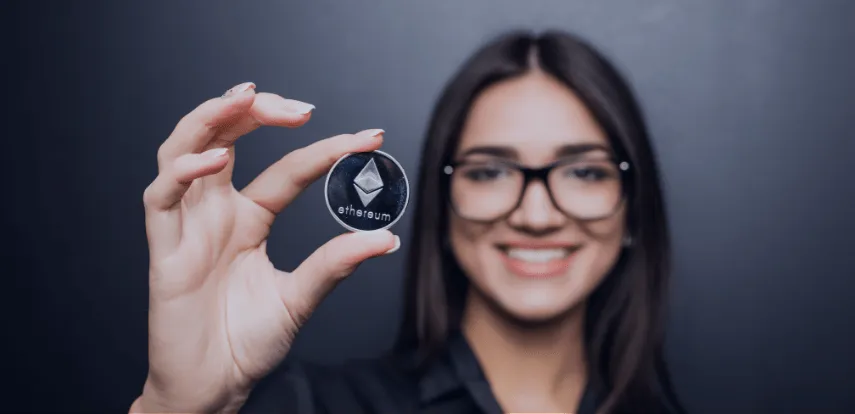
When developing and launching NFT projects, it’s important to be aware of several considerations and challenges. Here are some key points to keep in mind:
- Scalability and Network Congestion: High demand for NFTs can lead to network congestion and increased transaction fees. Consider the scalability of the chosen blockchain platform to ensure smooth operation during peak times.
- Environmental Impact: The energy consumption of certain blockchain networks, like Ethereum, has raised concerns regarding the environmental impact. Consider the sustainability aspect and explore alternative platforms or solutions with lower energy consumption.
- Copyright and Intellectual Property: Ensure proper rights and permissions for the assets being tokenized. Respect copyright laws and obtain necessary licenses or permissions to avoid infringement issues.
- User Experience and Adoption: Provide a user-friendly experience for creators, collectors, and investors. Simplify the process of minting, buying, and selling NFTs to encourage adoption among a broader audience.
- Smart Contract Security: Thoroughly audit and test smart contracts to identify and address vulnerabilities or potential security risks. Ensure proper security measures to protect the assets and users’ information.
- Market Saturation and Quality Control: With the increasing popularity of NFTs, the market can become saturated with low-quality or fraudulent projects. Maintain quality control and authenticity to build trust among users and collectors.
- Community Engagement and Support: Foster a strong and engaged community around your NFT project. Communicate with your community, address their concerns, and provide ongoing support to build loyalty and long-term success.
- Legal and Regulatory Compliance: Stay informed about the legal and regulatory landscape surrounding NFTs. Be aware of potential legal implications, tax obligations, and compliance requirements specific to your jurisdiction.
- Long-term Sustainability: Consider the long-term viability and sustainability of your NFT project. Plan for ongoing maintenance, updates, and improvements to meet evolving user needs and market demands.
- Market Volatility and Investor Risks: NFT markets can be volatile, with prices fluctuating rapidly. Educate users about the risks associated with investing in NFTs and encourage responsible decision-making.
By addressing these considerations and challenges, you can enhance the success and sustainability of your NFT project while ensuring a positive experience for all participants involved.


